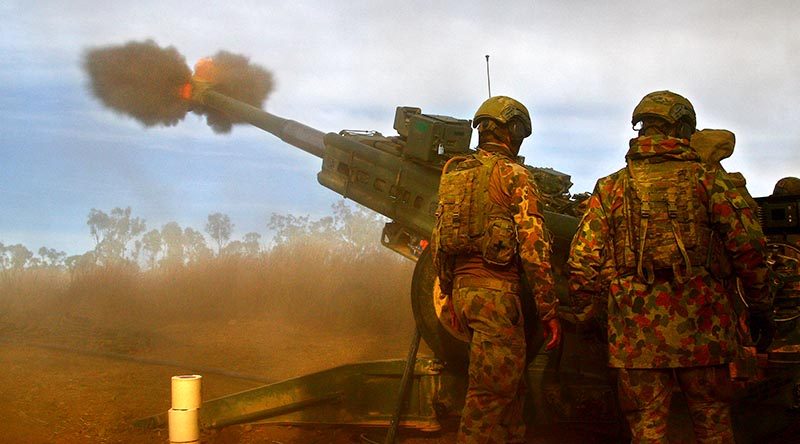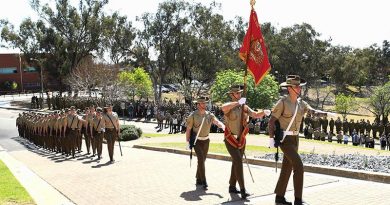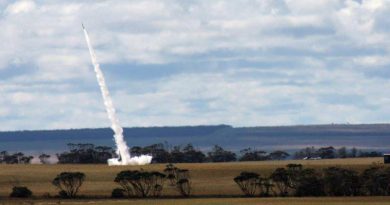Does political double speak bode ill for munitions manufacturing in Australia?
Share the post "Does political double speak bode ill for munitions manufacturing in Australia?"

Recently, Minister for Defence Industry Christopher Pyne announced two significant contracts for the supply of ammunition to the Australian Defence Force had been awarded to Brisbane-based NIOA, who have no military-ammunition-manufacturing capacity.
Related stories:
Subsequently, on 6 February, the minister announced that Defence “will [future tense] enter into negotiations with Thales Australia for the continued management and operation of Australia’s munition factories in Benalla, Victoria, and Mulwala, New South Wales”.
An existing contract with Thales is due to expire in 2020, but, Minister Pyne sought to assure the Bennalla and Mulwala workers and the Australian public – and Thales, no doubt – that the pending future negotiations (in which the government is already setting forth a strong agenda) “provides certainty for workers that both factories will remain open for the long term“.
Given the old adage that when a politician tells you he has your back, you better start worrying, one wonders just how secure ammunition manufacturing in Australia really is – especially since the earlier artillery-ammunition-contract announcement alluded to ammunition of German origins.
These press releases, in concert, seem to me to be saying a lot more than would appear on the surface.
Given the government’s strong focus on jobs, growth, defence-industry exports – and the fact that domestic ammunition production is surely the number one most important strategic capability to keep in Australia – one wonders if all this is but a veiled threat to Thales that their continuing tenancy of the government-owned munitions facilities is not assured?
Or is there a serious German takeover bid in the works perhaps?
Brian Hartigan
CONTACT Editor
FILE PHOTO: Soldiers from Townsville-based 4th Regiment Artillery fire an M777 155mm Howitzer in High Range Training Area. Photo by Brian Hartigan.
The minister’s press release in full…
Minister for Defence Industry, the Hon Christopher Pyne MP, today announced that Defence will enter into negotiations with Thales Australia, trading as Australian Munitions, for the continued management and operation of Australia’s munition factories in Benalla (Victoria) and Mulwala (New South Wales).
Minister Pyne said the Turnbull Government recognises the importance of the Defence- owned munitions factories that produce ammunition for the Australian Defence Force.
“With both facilities employing over 640 highly-skilled workers, this announcement provides certainty for workers that both factories will remain open for the long term”, Minister Pyne said.
“Under the existing contract, employment across the Benalla and Mulwala sites has increased by over 80 employees in 2017, generating vital job opportunities in regional Victoria and New South Wales.
“The Thales Australia supply chain includes 130 local small-to-medium enterprises, providing a wide range of goods and services to the Benalla and Mulwala sites.
“The negotiations with Thales will see a new strategic arrangement for the management and operation of the factories, improving price competitiveness and increasing export potential for Australian-manufactured ammunition and explosive products.
“This long-term, performance-based arrangement will provide a greater degree of certainty for Thales as the principal tenant and operator of the facilities and will enable seamless transition from the current contract when it expires in mid-2020.
“Drawing on the depth of engineering and manufacturing skills resident in these factories, the decision to commence negotiations with Thales builds on the well-established relationship between Thales and Defence.
“This announcement enables Defence to continue to capitalise on the more than $1.8 billion in investment it has made since the mid-1990s.
“The 1030 hectare Mulwala factory is the only remaining manufacturing site for propellants and high explosives in Australia, and the new propellant factory is arguably the most modern propellant manufacturing plant in the world,” Minister Pyne said.
The future arrangement will also see underutilised areas of the facilities sub-leased as additional precincts to other munitions companies, subject to maintaining high safety and security standards, either where Defence identifies a requirement for a particular product, or where a commercial or export opportunity exists.
.
.
.
.
.

.
.
Share the post "Does political double speak bode ill for munitions manufacturing in Australia?"






This has been going on for a long, long time. It costs money to set up the facilities and our national off-take is pitifully small. What you are referring to is the question around the capability of the latest iteration of the long list of government factories morphing into entities such as Australian Defence Industries (ADI) and then Thales (France). There is little in the way of Australian owned defence infrastructure remaining and most of it can quite easily be shown to be overseas owned.
Our ammunition production capability is actually quite large. It’s the off-take that’s the problem. When the then new high explosive manufacturing facilities were built in the early 90s, they were state of the art (Project REFA comes to mind). However, I recall that even then, our annual training consumption of production was only equal to about 3 weeks of actual factory production capability. It’s a problem of managing the cost of strategic capability. The same issue exists with the new propellant production facility.
This is what makes our home grown ammunition expensive without significant government subsidy.
Nioa has exploited some weakness in this arrangement and it puts pressure on Thales. I’ve met Robert Nioa and had a look at his facilities. I think he has basically invested in a business that takes his existing agency business model further into military areas. Who better to sell to than the government? It’s an astute move. Ammunition from SA and components from Germany. It meets the need and has gone through all the trials required.
Turnbull and Pyne’s rhetoric is a bit silly. We will be a net importer of expensive NATO compliant hardware and consumables for as long as we are tied to the USA. We may be able to, and actually do, export hardware and consumables in certain niche areas and that is where we may well be able to expand.
However, it will also take a disruption of the existing models. At the moment, our Defence Department is used to quite generous budget allocations and over the years has become accustomed to convincing the government to buy very expensive equipment. Anything we export will need a proof market and for most countries, it is their home defence forces. That is going to fly in the face of the current procurement model where nearly every “Australian” based company is merely an office of an overseas manufacturing entity staffed by ex-Australian defence force officers, usually senior.
Change that model and disrupt the unhealthily cosy procurement arrangements that currently predominate and we may have a chance of coming up with some home-grown initiatives.
Thanks Alex. That’s very insightful.
NIOA begain in the early ’90’s as one guy importing IPSC gun parts, before becoming the significantly large arms and EO importer. When your uncle (by marriage I belive) is Bob Katter, it’s easier to navigate the bureaucracy.
I think you will also find that NIOA is not manufacturing at this time but has subcontracting, representation and supply agreements with ATK and Rheinmetall.
Father-in-law actually. Robert Nioa has built on his father’s business and I think done a great job.
What’s hilarious is that ATK were the design authority for the technological solution for the new propellant plant that Thales will operate under contract on behalf of the government.
The question was asked in Parliament by the Member for Indi who has Mulwala in her electorate. Pyne gave a similar answer to the above. The Govt relies on the Member of Indi for support and she would not be happy if they closed the plants. These plants are major employers and it would affect the whole area. The employees could not afford to relocate plus it is an election year and even Pyne isn’t dumb enough to close the plants.
There seems to be no real maybe twisted promise all sounds great but when you think about it, the Government closed the munitions factory in the Blue Mountains, and can quite easily do it in this case, in fact the site in the mountains produced more than just ordinance. What dose this factory produce well you know how governments work sell off and contract out to cheaper companies over seas. This is just my thoughts on the matter, Lithgow was what I was trying to think of in the mountains
Hi Glenn. Lithgow Arms (in the Blue Mountains) is actually still up and running and producing great things, including the ADF’s new EF88, and several civilian weapons. Unlike the two munitions manufacturing facilities however (which are government owned, but leased and operated by Thales), I think Lithgow Arms is actually fully owned by Thales. But, it is still operating.
I think you will find Glenn is talking about Maragaroo, which was formerly used for minor explosive ordnance component assembly and storage. Currently used as an EOD and general training area.
Hi Damo. I’ve never even heard of Maragaroo – so thanks for the heads up. That said though, Glenn actually did specify Lithgow (in his last line).
Given the government’s announced intention of Australia becoming an arms exporter could it mean Pyne might be angling to get Thales to expand production in SA? Might he be buttering them up to accept a new manufacturing player to establish in SA with NIOA being the thin edge of the wedge? As you allude Brian, everyone should be watching their backs.
Thanks for your feedback Ray.